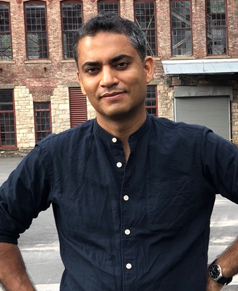Meet Dr. Mohammad Junaid, Cultural Anthropologist
September 20, 2018
 One of MCLA’s newest faculty members is Dr. Mohamad Junaid, a cultural anthropologist
who focuses on youth politics and the self-determination movement in Kashmir, an Indian-administered
territory, bordered by India, Pakistan and China.
One of MCLA’s newest faculty members is Dr. Mohamad Junaid, a cultural anthropologist
who focuses on youth politics and the self-determination movement in Kashmir, an Indian-administered
territory, bordered by India, Pakistan and China.
“I grew up in Kashmir—a beautiful region with dynamic cultural traditions that have weathered centuries of political changes, but which in the present remains violently divided and under a long-term military control,” Junaid explained. “Living in a space of such complexity compelled me to ask critical questions about social inequality, identity, and the idea of nation-state.”
According to Junaid, “Anthropology provided me with intellectual tools to step outside of my own sense of the ‘right’ way to be and do things in the world, and ask questions in new, imaginative ways. It was liberating to be able to reflect upon and appreciate the human capacity to be creative and empathetic, as well as violent and dangerous.”
For his research, Junaid uses ethnographic and historical methods to study state violence and political subjectivity in Kashmir, and in South Asia’s borderlands. This includes his research into youth politics in Kashmir, which he sees as part of much larger global justice movements that recently have risen, and have been suppressed, across the world.
Through the courses he will teach at MCLA – which he has designed to stimulate participation and a love of learning – Junaid hopes that his students will learn new intellectual tools so they might explore deeper thinking on their own, as they enhance their critical thinking and scholarly perspectives.
“To be able to benefit from the classes requires a willingness to remain radically open to diverse ideas and critical self-reflection. My true sense of accomplishment comes when students imbibe these values in the way they interact and engage with each other: by giving each other opportunities to speak, actively listening to each other, and tackling tough questions without dismissing each other’s experiences.”
